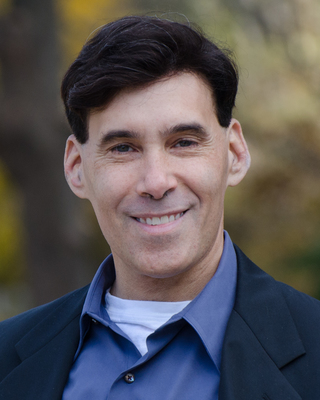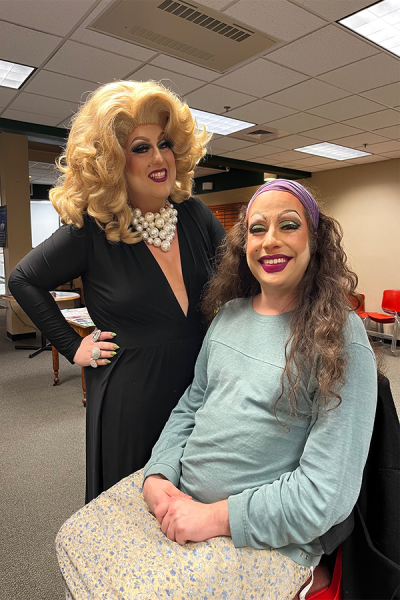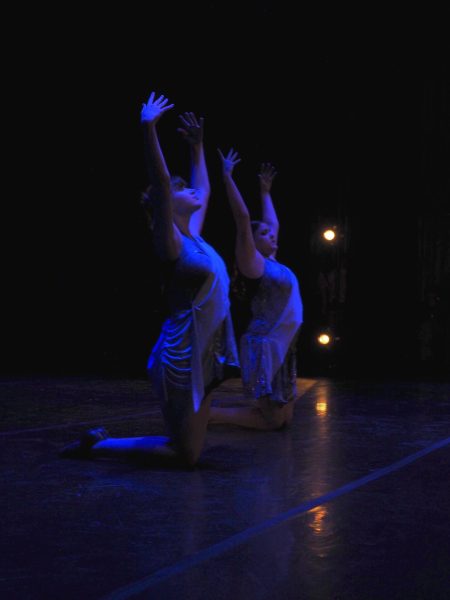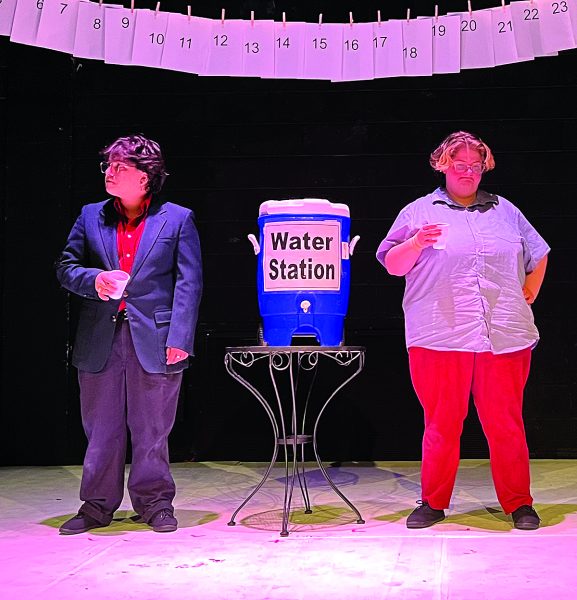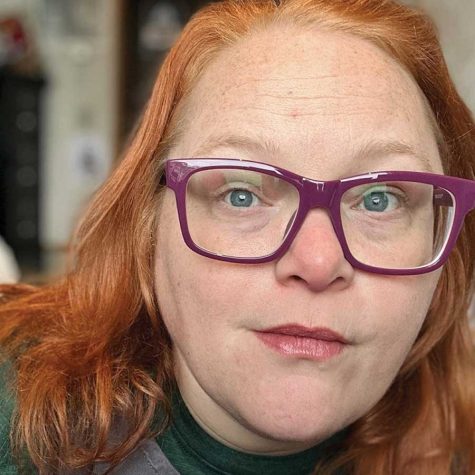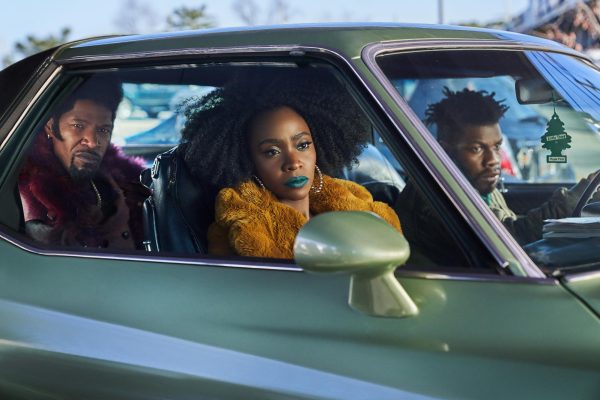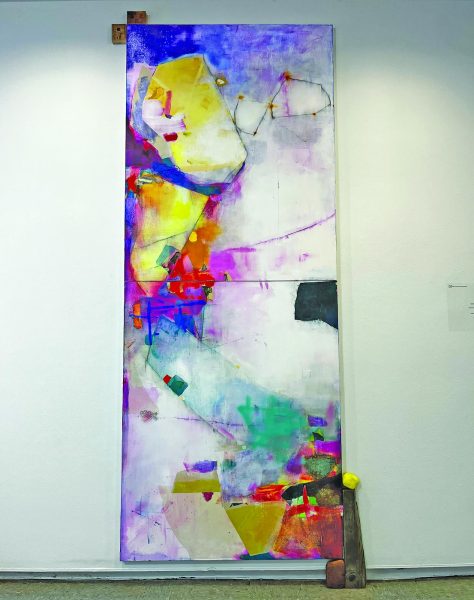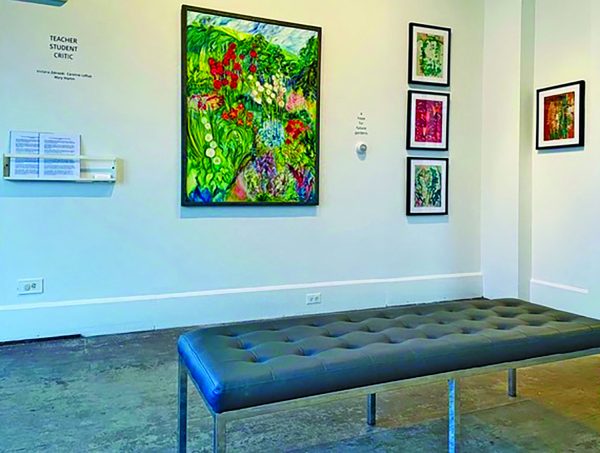A behind-the-scenes look at “Beauty Queen of Leenane”
In the dark, winding halls of the Dibden Center of Performing Arts, Emily Pike, special effects makeup specialist, frantically looks for the gelatin-based prosthetic molding compound she uses to make life-like burns and injuries. Finding the compound, Pike hurries back to where the crowd of four is.
In Dressing Room A, Gabrielle D. Straight, playing Mag Folan in the production of “Beauty Queen of Leenane,” is practicing her Irish accent in the vanity mirror while Pike creates the life-like burn with the molding compound she was so desperately looking for.
A small group of people enter the room, conversing through Irish accents, rehearsing even before Will Davis, Dibden technical director, calls the official rehearsal. Jessica DeRosa, stage manager, rushes through the door, holding a black skirt that needed to be altered for Molly Burnett, playing Maureen Folan. The whole cast has a sense of urgency in their eyes. The swinging door to the dressing room makes a soft buzz as it opens and closes frequently. Stage makeup is being done in full speed, almost as if it were opening night. Boisterous laughter fills the heavy basement air. And all too soon, rehearsal is called.
The set of “Beauty Queen of Leenane” is a step back in time. A beautiful scene of an Irish home, equipped with a rocking chair and a simple, yet charming vibe garnishes the center of the dark, blackbox theatre. The main curtains to the orchestral stage closes, leaving little to no light from the outside world other than a blue hue that hovered over the set. The only important things on the actors’ and actresses’ minds are their characters.
Each essential part of the show steps on stage. The lights dim to a deep auburn and then to complete blackness. Davis signals for the show to start, hovering in the dark of the blackbox theatre, eager for a successful rehearsal.
The once dark and eerie blackbox theatre is now lit with an extravagant yellow, heating the room ever so slightly each minute. The cast is now in action, moving with finesse and hitting every line of dialogue.
Rarely does anyone ask for help. As the rehearsal continues, the more focused the cast, director and crew become.
DeRosa sits behind the row of black chairs adorning the stage. Quietly speaking into her headset and holding a large binder filled with notes, she signals every cue for lights, sound and the start and end of each scene.
In the background, Joshua Poland focuses on hitting every light cue that is given. In each scene, the lights turn on from a bright auburn to a heavy black, creating a dramatic exit and entrance.
Straight, a happy and bubbly singer backstage, is now a crotchety old woman, angry with her daughter, living a low-quality of life due to a closed view of the world. Burnett miraculously turns into a middle-aged woman with a very low tolerance for her elderly mother. Colton White, playing Ray Dooley, and Sam Lewis, playing Pato Dooley, turn into characters that resemble not one ounce of their off-stage being.
And then the show is over, and the lights dim back to the blue that started the journey of the two- hour rehearsal. The actors and actresses flock together, standing by Davis so they can converse about the rehearsal; not taking one break, working throughout the night.
According to Straight, one part of making this performance a successful one when it hit the main stage was having the Irish accents sound authentic. “When they say that practice makes perfect, they aren’t wrong,” said Straight. “I would wake up in the morning and start my day off talking in an Irish accent, incorporating it into simple parts of my life. Then, over time, I would catch myself talking in the accent even when I wasn’t meaning too. It is really all about commitment, and if you work hard enough to incorporate it into your everyday life, it will, literally, come naturally. ”
For Davis, who went to graduate school in Britain and was around the Irish, Scottish and English, accents are no problem. He worked a lot with accent work, especially with Brits trying to sound like Americans, and now back in the United States, he works with Americans trying to sound like Brits. Davis also noted that mastering accents requires a lot of hard work and dedication.
Casting, of course, is crucial to a successful show, and Davis feels the process begins with the people who are auditioning knowing the script well, as well as the characters. Casting the perfect cast isn’t just reading the script, however. It’s far more, according to Davis. “It’s not necessarily saying this character needs to be six-foot tall or have brown hair to the shoulders,” he said. “It’s not like that for me. I try to get some ideas about the character, and go in and see who I’m seeing audition, and let that inform me. [I consider] their demeanor: are they tense, excited? And then, I would put the pieces together.”
In essence, says Davis, the most important thing is how the person embodies the role they are playing, and how they get along with the rest of the cast. Chemistry is everything.
A successful performance is a hard thing to define, even for the director of “Beauty Queen.”
“If you take the actors, and the script, the designers, and you kind of put it together and you get something greater than the sum of the parts – I think if you can make more out of the story than you could get otherwise. I think that’s successful,” he said. “And you never know if you do this really, but if you make people think, or you make people feel, I believe you have succeeded. I think that is successful theater.”
If that black box rehearsal is any indication, that success also depends on the hard work of many, often including labor off-stage, well out of the audience’s sight.



